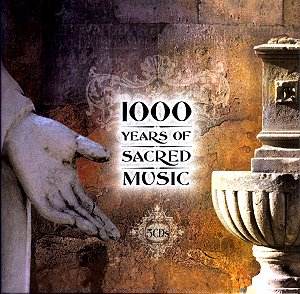













BUY NOW
1000 YEARS OF SACRED MUSIC
CD 1 [78.11]
Ambrosian and Gregorian Chant for the Feast of the Epiphany
Halleluiah (Puer Natus Est) [5.10]
Symbolum (Credimus in Unum Deum) [3.25]
XIth Century French Polyphony: Easter Mass
Trope: Paschale Carmen - Introit: Resurrexit [5.40]
Gradual: Haec Dies [3.23]
Organum: Alleluia V, Pascha Nostrum V, Epulemur [4.33]
Antiphon: Ego sum Alpha et Omega [3.45]
Office for the New Year at Puy-en-Velay Cathedral (XIIth century)
Veni Redemptor Gancium [4.37]
Pater Noster [1.53]
Pierre ABELARD (1079-1142)
O Quanta Qualita, motet [7.47]
PEROTIN (c. 1200)
Alleluia Posus Adjutorium [9.24]
Llibre Vermell de Montserrat (XIVth century)
O Virgo Splendens Hic in Monte Celso [3.57]
Mariam Mater Virginem [7.18]
Guillaume DE MACHAUT (c. 1300-1377)
Messe De Notre Dame
Kyrie [5.12]
Gloria [4.01]
Sanctus and Benedictus [4.30]
Agnus Dei [3.05]
CD 2 [76.03]
John DUNSTABLE (c. 1390-1443)
Veni Sancte Spiritus [6.24]
Guillaume DUFAY (1400-1474)
Nuper Rosarum Flores [6.45]
Johannes OCKEGHEM (c. 1410-1497)
Alma Redemptoris Mater [5.43]
Josquin DES PREZ (c. 1440-1521)
Pater Noster [7.35]
Orlando de LASSUS (1532?-1594)
Resonet in Laudibus [3.15]
Giovanni Perluigi da PALESTRINA (c. 1525-1594)
The Song of Songs: Pulchra es Amica Mea [2.37]
Ave Maria [3.27]
Heinrich SCHÜTZ (1585-1672)
Jauchzet Dem Herren Alle Welt SWV493 [7.34]
Gregorio ALLEGRI (1582-1652)
Miserere [12.54]
Claudio MONTEVERDI (1567-1643)
Selva Morale e Spirituali (1640): Beatus Vir [8.54]
Thomas TALLIS (c. 1505-1585)
Spem in Alium [10.17]
CD3 [79.01]
Marc-Antoine CHARPENTIER (1643-1704)
Te Deum:
Pré lude [1.51]
Te Deum Laudamus [1.28]
Te Aeternum Patrem [1.43]
Pleni Sunt Coeli et Terra [2.10]
Messe de Minuit:
Kyrie [6.25]
Antonio VIVALDI (1678-1741)
Gloria in D:
Gloria in Excelsis [2.25]
Et in Terra Pax [4.46]
Henry DU MONT (1668-1733)
Nisi Dominus (verse 1) [2.32]
André CAMPRA
(1660-1744)
Tum Acceptaberis (verse 20 of the Miserere) [2.34]
Louis CLÉRAMBAULT (1676-1749)
Justificeris Domino [0.31]
Miserere Mei Deus [3.57]
Franç ois
COUPERIN (1668-1733)
Tabascere Me Fecit [3.56]
Jean-Philippe RAMEAU (1683-1764)
In Convertendo, Dominus:
In Convertendo [3.09]
Tunc Repletum est Gaudio [3.06]
Magnificat Dominus Facere Nobiscum [3.41]
Giovanni Battista PERGOLESI (1710-1736)
Stabat Mater:
Stabat Mater Dolorosa [4.39]
Vidit Suum Dulcem Natum [3.20]
Eja Mater Fons Amoris [2.08]
George Frideric HANDEL (1685-1759)
Dixit Dominus [5.18]
Messiah:
Halleluiah [4.20]
Johann Sebastian BACH (1685-1750)
Jesu Bleibet Meine Freude BWV147 [2.12]
Mass in B Minor:
Qui Sedes ad Dexteram Patris [4.26]
St John Passion:
Ruht Wohl, Ihr Heiligen Gebeine [8.03]
CD4 [78.04]
Wolfgang Amadeus MOZART (1756-1791)
Requiem K.626:
Requiem Aeternam [4.01]
Kyrie Eleison [2.13]
Lacrimosa [3.35]
Ave Verum Corpus K.618 [2.36]
Franz SCHUBERT (1797-1828)
Hymn to the Holy Ghost D.964 [7.20]
Ludwig van BEETHOVEN (1770-1827)
Missa Solemnis Op..123:
Agnus Dei [6.11]
Luigi CHERUBINI (1760-1842)
Requiem in Memory of Louis XVI:
Introit and Kyrie [7.17]
Gioachino ROSSINI (1792-1868)
Stabat Mater:
Inflammatus et Accensus [4.17]
Felix MENDELSSOHN (1809-1847)
Wie Der Hirsch Schreiet Nach Frischen Wasser [5.50]
Charles GOUNOD (1818-1893)
Messe Solennelle de Sainte Cécile:
Domine Salvum [3.32]
Johannes BRAHMS (1833-1897)
A German Requiem:
Ihr Habt Nun Traurigkeit [6.22]
Guiseppe VERDI (1813-1901)
Messa da Requiem:
Dies Irae [2.15]
Lux Aeterna [6.17]
César FRANCK (1822-1890)
Rédemption:
Devant la Loi Nouvelle [4.15]
Gabriel FAURÉ (1845-1924)
Requiem:
Pie Jesu [3.24]
Libera Me [4.33]
In Paradisum [3.33]
CD 5 [74.15]
Sergei RACHMANINOV (1873-1943)
Vespers Op.37:
Nunc Dimittis [3.29]
Ave Maria [2.38]
Samuel BARBER (1910-1981)
Angus Dei [7.42]
Francis POULENC (1899-1963)
Quatre Motets Pour le Temps de Noë
l
O Magnum Mysterium [3.21]
Quem Vidistis Pastores Dicite [2.37]
Videntes Stellam [3.10]
Hodie Christus Natus Est [2.04]
Maurice DURUFLÉ (190-1986)
Requiem Op.9:
Kyrie [3.31]
Pie Jesu [3.26]
Libera Me [5.37]
In Paradisum [2.44]
Olivier MESSIAEN (1908-1992)
O Sacrum Convivium [5.04]
Benjamin BRITTEN (1913-1976)
A Shepherd's Carol [4.06]
Igor STAVINSKY (1882-1971)
Credo [2.54]
Krzystof PENDERECKI (b.1933)
Ave Maria [7.00]
Henryk GORECKI (b.1933)
Totus Tuus [8.50]
Arvo PÄRT (b.1935)
De Profundis [5.27]
Various Artists including:
Schola Cantorum Coloniensis/Harald Scloßmacher
Ensemble Gilles Binchois/Dominique Vellard
Studio der Frühen Musik/Thomas Binkley
Hespérion XX/Jordi Savall
Taverner Consort, Choir and Players/Andrew Parrott
The Hilliard Ensemble/Paul Hillier
The King's Singers
The Choir of Clare College, Cambridge/Timothy Brown
Knabenchor Hannover / London Baroque/Heinz Hennig
The Choir of King's College, Cambridge/Stephen Cleobury
Academy of St Martin-in-the-Fields/Neville Marriner
English Chamber Orchestra/David Willcocks
Les Pages de la Chapelle / Musica Aeterna Orchestra of Bratislava/Olivier
Schneebeli
La Grande Ecurie et la Chambre du Roy/Jean-Claude Malgoire
Les Demoiselles de Saint-Cyr/Emmanuel Mandrin
Les Talons Lyrique/Christoph Rousset
Le Concert Spirituel/Hervé Niquet
Il Seminario Musicale/Gérard Lesne
Schütz Choir / London Classical Players/Roger Norrington
Capella Bavariae / Symphony Orchestra of Bavarian Radio/Wolfgang Sawallisch
Tallis Chamber Choir / English Chamber Orchestra/Jeffrey Tate
Ambrosian Singers / Philharmonia Orchestra/Ricardo Muti
Chorus and Orchestra of the Maggio Musicale Fiorentino/Ricardo Muti
London Symphony Chorus / City of London Sinfonia/Richard Hickox
Choeurs et Nouvel Orchestre Philharmonique de Radio-France/Georges Prê
tre
Orféon Donostiarra / Orchestre du Capitole de Toulouse/Michel Plasson
Winchester Cathedral Choir / Bournemouth Sinfonietta/David Hill
Swedish Radio Choir/Tö no Kaljuste
The Sixteen/Harry Christophers
London Sinfonietta Voices and Chorus- Terry Edwards
Estonian Philharmonic Chamber Choir/Tö
no Kaljuste
rec. various dates between 1967 and 1998.
![]() VIRGIN CLASSICS 7243
5 62126 2 6 [78.11+76.03+79.01+78.04+74.15]
VIRGIN CLASSICS 7243
5 62126 2 6 [78.11+76.03+79.01+78.04+74.15]